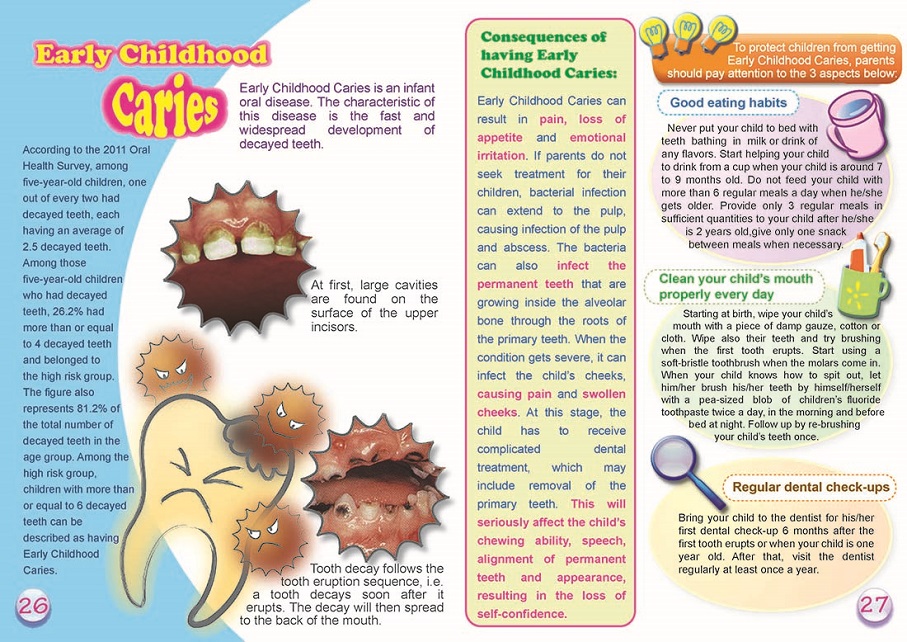Booklet - Oral Health Care for your Children

Early Childhood Caries
According to the 2011 Oral Health Survey, among five-year-old children, one out of every two had decayed teeth, each having an average of 2.5 decayed teeth. Among those five-year-old children who had decayed teeth, 26.2% had more than or equal to 4 decayed teeth and belonged to the high risk group. The figure also represents 81.2% of the total number of decayed teeth in the age group. Among the high risk group, children with more than or equal to 6 decayed teeth can be described as having Early Childhood Caries.
Early Childhood Caries is an infant oral disease. The characteristic of this disease is the fast and widespread development of decayed teeth.
At first, large cavities are found on the surface of the upper incisors.
Tooth decay follows the tooth eruption sequence, i.e. a tooth decays soon after it erupts. The decay will then spread to the back of the mouth.
Consequences of having Early Childhood Caries:
Early Childhood Caries can result in pain, loss of appetite and emotional irritation. If parents do not seek treatment for their children, bacterial infection can extend to the pulp, causing infection of the pulp and abscess. The bacteria can also infect the permanent teeth that are growing inside the alveolar bone through the roots of the primary teeth. When the condition gets severe, it can infect the child’s cheeks, causing pain and swollen cheeks. At this stage, the child has to receive complicated dental treatment, which may include removal of the primary teeth. This will seriously affect the child’s chewing ability, speech, alignment of permanent teeth and appearance, resulting in the loss of self-confidence.
To protect children from getting Early Childhood Caries, parents should pay attention to the 3 aspects below:
Good eating habits
Never put your child to bed with teeth bathing in milk or drink of any flavors. Start helping your child to drink from a cup when your child is around 7 to 9 months old. Do not feed your child with more than 6 regular meals a day when he/she gets older. Provide only 3 regular meals in sufficient quantities to your child after he/she is 2 years old, give only one snack between meals when necessary.
Clean your child’s mouth properly every day
Starting at birth, wipe your child’s mouth with a piece of damp gauze, cotton or cloth. Wipe also their teeth and try brushing when the first tooth erupts. Start using a soft-bristle toothbrush when the molars come in. When your child knows how to spit out, let him/her brush his/her teeth by himself/herself with a pea-sized blob of children’s fluoride toothpaste twice a day, in the morning and before bed at night. Follow up by re-brushing your child’s teeth once.
Regular dental check-ups
Bring your child to the dentist for his/her first dental check-up 6 months after the first tooth erupts or when your child is one year old. After that, visit the dentist regularly at least once a year.


